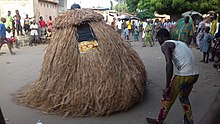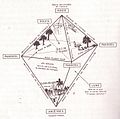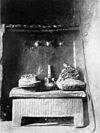Portal:Traditional African religions
Introduction The beliefs and practices of African people are highly diverse, including various ethnic religions. Generally, these traditions are oral rather than scriptural and are passed down from one generation to another through folk tales, songs, and festivals, and include beliefs in spirits and higher and lower gods, sometimes including a supreme being, as well as the veneration of the dead, and use of magic and traditional African medicine. Most religions can be described as animistic with various polytheistic and pantheistic aspects. The role of humanity is generally seen as one of harmonizing nature with the supernatural. In the past, African religion used to be referred to as 'traditional' but this is no longer appropriate. 'Traditional' was used to distinguish Africa religion from Abrahamic religion which came to the continent as a result of proselytism. Colonialism supported the false view that Africa had no religion. (Full article...) Selected article
Vodun (meaning spirit in the Fon and Ewe languages, pronounced [vodṹ] with a nasal high-tone u; also spelled Vodon, Vodoun, Vodou, Voudou, Voodoo, etc.) is practiced by the Fon people of Benin, and southern and central Togo; as well in Ghana, and Nigeria. It is distinct from the various traditional African religions in the interiors of these countries and is the main source of religions with similar names found among the African diaspora in the Americas, such as Haitian Vodou; Dominican Vudú; Cuban Vodú; Brazilian Vodum (candomblé jeje and tambor de mina); Puerto Rican Vudú (Sanse); and Louisiana Voodoo. Selected imagesFestivalsThere are several religious festivals found in the various Traditional African religions. Some of these are listed below next to their corresponding religion :
Selected biographyMaad Semou Njekeh Joof (or Maad Semou Djiké Diouf) was a member of the Joof Dynasty of the Kingdom of Sine now part of independent Senegal. Maad means king and Maad a Sinig means king of Sine in Serer. He was the founder of the Royal House of Semou Njekeh Joof, founded in the early eighteenth century. His royal house was the third and last royal house founded by the Joof family of Sine and Saloum. Since its foundation, at least seven kings of Sine from his royal house had succeeded to the throne including his son Maad a Sinig Boukar Tjilas Sanghaie Joof. In the Serer religion, Semou Njekeh Joof is immortalized in the cult of Tagdiam. The principle shrine of Tagdiam is named after him. Tagdiam in present-day Senegal was where he lived. Selected quote
Roger S. Gottlieb Source: Gottlieb, Roger S., The Oxford Handbook of Religion and Ecology, Oxford University Press (2006), p. 261, ISBN 9780199727698 [1]
Did you know
Related portalsTopicsFor more Traditional African religion topics, see Category:Traditional African religions.
CategoriesWikiProjectsThings you can doAssociated WikimediaThe following Wikimedia Foundation sister projects provide more on this subject:
Discover Wikipedia using portals |






































